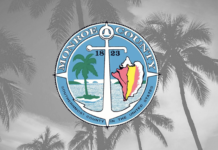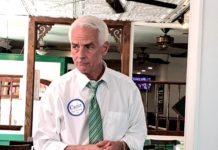The coronavirus pandemic set political campaigning techniques back about 20 years or so.
“It’s back to the old school techniques when you didn’t have all that electronic and digital whiz bang stuff,” said Doug Harrison. He and his wife, Sue, are behind-the-scenes campaign helpers and managers. This year, both of their charges — Sheriff Rick Ramsay and Monroe County School Board chairwoman Mindy Conn — were elected unopposed.
And that, they said, is the first point.
“I think that’s why we saw so many local officials run unopposed in 2020,” said Sue Harrison. “Challengers realized they were going to be dead ducks. It’s difficult to get out in front of voters during the pandemic, and it’s even harder to raise money, so expenses were going to have to come out of their own pocket.”
Local candidates learned that lesson early, in mid-May. An increased number had to pay to register for the race, rather than collect signatures to get their names on the ballot. Democrat Clint Barras, a first-time candidate for state representative either needed to collect 1,013 signatures or pay an $1,781 filing fee. He paid it.
Fundraising has always been its own challenge, but especially in 2020.
“Listen, the people who write checks will always write checks,” said state Rep. Holly Raschein who is at the end of her last term. “But when you have a fundraising event, the best part is the face-to-face interaction. You invite your friends and they invite their friends and they get to see you in action. They think, ‘That’s someone I can vote for. She’s likable.’”
In the Keys, candidates hold meet and greets, attend club meetings and hobknob at political forums. Generally, that’s a great way to get supporters to whip out a checkbook. In a pandemic, all of that is canceled; if it does happen, it happens virtually and the outcome is different. Still, some candidates are doing just fine in the fundraising department.
The local races that build the largest war chest are sheriff or county commission. In 2018, County Commissioner Michelle Coldiron raised $64,000, at the time a record-breaking amount. In 2020, Craig Cates has raised $98,000 for the District 1 county seat. (Gov. Ron DeSantis appointed Cates to finish Danny Kolhages’ term who stepped down; so this will be Cates’ first run for office.) However, in the race for District 3, incumbent Heather Carruthers has raised $6,000, about the same as her challenger Eddie Martinez.
“The canceled fundraisers are crippling because that’s how you collect the small contributions — $10, $25 at a time. At the end of the night, that can add up to several thousand,” Doug Harrison said.
“And during the pandemic, most of those people that make the small contributions, don’t have the money. They’re not working,” said Sue Harrison.
Raschein said the funds help candidates pay for advertising, the most expensive aspect of campaigning. On the other hand, there’s small savings to be had, too — no “swag” to buy such as koozies or magnets or T-shirts.
So, what’s the best way to campaign during a pandemic? Go old school. The Harrisons and Raschein are telling colleagues to go knock on doors and mail flyers, both still possible while maintaining social distance.
Sue Harrison has two other pieces of advice for local candidates: One, collect endorsements. In the best situations those can equal contributions and votes. Two, candidates should be holding a sign every morning.
“Start way before the general election. Every morning we were at ‘the triangle’ in Key West with Sheriff Rick Ramsay. We got lots of thumbs up and honks,” she said.


























